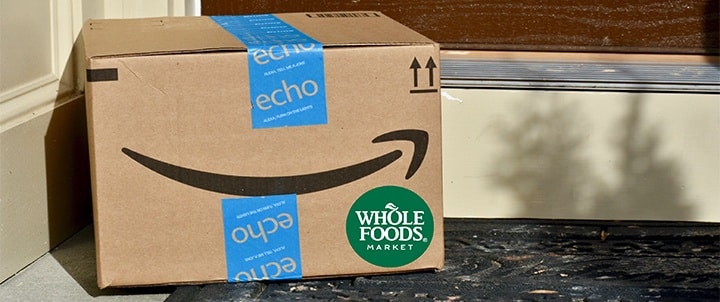There’s been a lot of hype during the last two weeks around Amazon’s acquisition of Whole Foods. Just when you thought that the traditional retail industry couldn’t be in a more serious state of upheaval, e-commerce and cloud pioneer Amazon announced its plan to purchase the high-end grocery store chain Whole Foods for $13.7 billion – it’s largest acquisition ever. It would be an understatement to say that this deal will only have serious implications for the future of grocery stores, as it’s going to impact the future of the retail industry as a whole. Disruption and innovation are nothing new for Amazon, in fact, it’s what the company is a master of. It’s just another spur (and a sharp one) for retailers to get moving on new strategies to be able to survive in today’s rapidly changing and hyper-competitive world of commerce.
To those unfamiliar with the inner workings of the retail industry, the deal might be a bit confusing, particularly because Amazon is paying big to get into the brick-and-mortar retail landscape it successfully started disrupting more than two decades ago. However, this isn’t Amazon’s first foray, as the company realized that e-commerce hasn’t completely killed off traditional retail and started opening up physical locations of its own back in 2015. This deal enables Amazon to hit the ground running on that strategic initiative.
Potential implications for the CPG industry
While we have seen much activity in traditional retailers acquiring e-commerce businesses or technology companies to enhance their online presence and meet the demands of an increasingly omnichannel world, the Amazon/Whole Foods deal has the potential to make long-lasting changes in the retail industry:
- Distribution. In the traditional model, groceries work with wholesalers that specialize in certain products – dairy, meat, produce, frozen and canned goods, and so on. If Amazon’s new model works out well, and by coupling its large distribution centers with Whole Foods’ brick-and-mortar locations, the middleman distributors could get cut out of the equation altogether.
- Logistics. Getting products from the producer to the consumer in the speedy times they have come to expect today is still a major challenge for grocers. Merging Amazon’s large and efficient distribution centers with nearby Whole Foods markets can shorten the SCM lifecycle to get products to the store and potentially offer more sustainable home delivery options for the consumers who prefer.
- Labor. Staffing grocery stores is expensive as the business is extremely labor-intensive. In fact, in 2016 the US Bureau of Labor Statistics reported that there were nearly 2.7 million people working hundreds of capacities across the entire supply chain of the grocery industry. Even though Amazon has claimed that there will be no job reductions as a result of the deal, the company’s automated distribution model will inevitably displace workers down the line.
- Retail experience. While many still want to go into stores to shop for groceries, an increasing number of people are already doing their shopping online from mobile devices. Further, customers fit fairly neatly into two brackets today – those that like the more intimate in-store experience Whole Foods offers, and those that enjoy the big-box warehouse experience at places like Wal-Mart or Costco. By taking over Whole Foods’ 460 brick- and-mortar locations and also streamlining the online ordering and delivery process, Amazon is putting itself in a leading position to cater to a wider demographic than its leading competitors.
All said and done, the massive deal – if it goes through – has huge implications for the industry as a whole. With retail bankruptcies currently at levels not seen since the Great Recession of 2008-09, in large part due to Amazon itself, retail executives in the industry simply must be in the business of disruption and innovation to survive in today’s omnichannel world.

